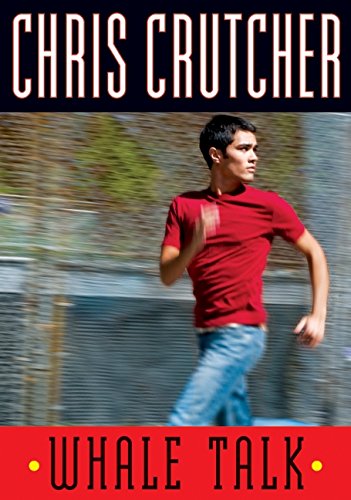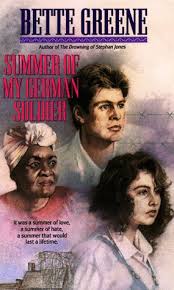Whale Talk
Chris Crutcher (YA Fiction)
It’s interesting being “of color” in a part of the country where Mark Fuhrman has his own radio talk show. My parents have always encouraged me to be loud when I run into racism, but I can’t count on racism being loud when it runs into me.
The Tao “T.J.” Jones is almost 18, adopted, and of mixed race (he’s black, Japanese, and white). He’s had to deal with racism early and often and isn’t much bothered by it anymore. What bothers him NOW is the elitism and exclusivity that the Cutter High School athletics department has placed on earning a letter jacket—an article of clothing he vehemently avoids acquiring. But after he’s recruited (rather academically coerced) into starting a swim team, he sets his sights on taking back his slice of the pie and assembles the unlikeliest group of misfits with the promise that each will earn a letter jacket of their own. Over the weeks, these young men not only begin to strengthen physically, but they start to heal emotionally and the lessons they learn in the water will stay with them long after the last swimmer touches the wall.
Crutcher’s Whale Talk was one of the American Library Association’s Top Five Most Challenged Books in 2005 and was removed from the Limestone County, Alabama school district’s five high school libraries for racism and offensive language. But the book also received countless honors and awards—all well deserved. Was the language spicy and derogatory? Sure was. There were also instances of physical abuse, bullying, child abuse, sexual assault, not to mention a little teacher-student blackmail, but instead the school board decided to focus on the “bad words” thus denying its students the opportunity to benefit from the many lessons contained in this exceptional book.
Whale Talk is my first introduction to Chris Crutcher and it won’t be my last. The story (think The Sandlot meets The Outsiders) is a feel-good story about a bunch of misfits who—led by a no-nonsense coach; a homeless, loyal assistant; and a talented, fearless team captain—band together to defy the odds and earn themselves a coveted prize. It’s a tale as old as time. Crutcher could have easily written a trite and predictable underdog story, but instead delivers a tale full of heart, hope, and forgiveness. These kids are diamonds in the rough and each is given an opportunity to shine and show their worth not only to their team, but to one another. These are principled young men who understand that they’re not fighting for a jacket with a fancy letter, but they’re standing up against stereotypes and proving that they are more than the label they’ve been assigned by their peers and society. These characters are steadfastly devoted to each other and you can’t help but cheer as each touches the wall and moves closer to achieving their goal. Crutcher is a master storyteller and truly taps into the high-school mindset with characters that are relatable, likeable, and you just can’t help but root for. With morally centered characters (including T.J.’s adoptive parents and especially his father who was given an incredibly heartbreaking backstory) and themes of acceptance, perseverance, and grace, Whale Talk should be moved from the banned books and instead placed on the required reading list.
Although T.J. may have started this journey with a questionable motive, he learned a lot about his teammates and himself along the way. There is a common theme of being able to project your own thoughts and feelings to the world so that everyone would instantly know your challenges, struggles, triumphs, and joys. T.J.’s therapist once told him that, “There is very little about humans that doesn’t have to do with connection.” Author Rachel Naomi Remen wrote, “The most basic and powerful way to connect to another person is to listen.” Imagine how many problems we could solve if we all just stopped being human for a moment and instead started acting a bit more like whales.
Rating: 5/5
* Book cover image attributed to: www.abebooks.com
We’re now posting videos of some of our book reviews! Follow us on Facebook at www.facebook.com/thedustyjacket or on Instagram @tdjreviews and join in on the fun!




